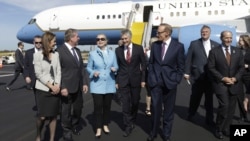SYDNEY —
U.S. Secretary of State Hillary Clinton has talks with the Australian Prime Minister Julia Gillard in Perth Tuesday. United States access to air bases in Western Australia are expected to be discussed.
Australia’s naval bases and airfields are crucial to Washington’s plans, announced last year, to switch its strategic focus to the Asia-Pacific region as China’s military and economic growth continues to increase.
Enhanced military co-operation, including whether American warships will be allowed to increase their use of Western Australia’s Stirling Naval Base near the state capital, Perth, is expected to dominate high-level discussions.
Clinton, whose travel to Western Australia coincides with that of U.S. Defense Secretary Leon Panetta, is holding talks with Australian Prime Minister Julia Gillard in Perth before broader ministerial discussions start Wednesday.
The AUSMIN (Australia-United States Ministerial Consultations) dialogue is an annual gathering of senior members of both governments.
Analysts do not expect Australia’s decision to cut $5.5 billion from its defense budget to unsettle the long-standing security relationship with the United States, which is also reassessing its military spending.
Professor Bates Gill, the head of the United States Studies Center at the University of Sydney, says that, despite more austere times, the United States will retain its military supremacy of China.
“The United States military, in spite of what might be a slow-down in its spending, is going to remain the single most powerful military," said Gill. "China simply does not have anything close to that type of infrastructure, that type of commitment, that type of political military power, which the United States has amassed over these six or seven decades in the Asia Pacific.”
Australia’s formal defense ties with Washington date back 60 years. Successive governments in Canberra have insisted the relationship is the cornerstone of Australia’s national security.
However, the challenge for Australia is to enhance this pivotal security alliance while at the same time develop closer military and economic ties with China, its biggest trading partner.
The AUSMIN summit is the first since U.S. President Barack Obama visited Australia last year and announced that up to 2,500 U.S. Marines would rotate through a joint military training facility in the northern city, Darwin.
Afghanistan will also feature in these high-level talks discussions. Australia has 1,550 troops in Afghanistan and is the biggest military contributor to the U.S.-led campaign outside NATO.
Australia’s naval bases and airfields are crucial to Washington’s plans, announced last year, to switch its strategic focus to the Asia-Pacific region as China’s military and economic growth continues to increase.
Enhanced military co-operation, including whether American warships will be allowed to increase their use of Western Australia’s Stirling Naval Base near the state capital, Perth, is expected to dominate high-level discussions.
Clinton, whose travel to Western Australia coincides with that of U.S. Defense Secretary Leon Panetta, is holding talks with Australian Prime Minister Julia Gillard in Perth before broader ministerial discussions start Wednesday.
The AUSMIN (Australia-United States Ministerial Consultations) dialogue is an annual gathering of senior members of both governments.
Analysts do not expect Australia’s decision to cut $5.5 billion from its defense budget to unsettle the long-standing security relationship with the United States, which is also reassessing its military spending.
Professor Bates Gill, the head of the United States Studies Center at the University of Sydney, says that, despite more austere times, the United States will retain its military supremacy of China.
“The United States military, in spite of what might be a slow-down in its spending, is going to remain the single most powerful military," said Gill. "China simply does not have anything close to that type of infrastructure, that type of commitment, that type of political military power, which the United States has amassed over these six or seven decades in the Asia Pacific.”
Australia’s formal defense ties with Washington date back 60 years. Successive governments in Canberra have insisted the relationship is the cornerstone of Australia’s national security.
However, the challenge for Australia is to enhance this pivotal security alliance while at the same time develop closer military and economic ties with China, its biggest trading partner.
The AUSMIN summit is the first since U.S. President Barack Obama visited Australia last year and announced that up to 2,500 U.S. Marines would rotate through a joint military training facility in the northern city, Darwin.
Afghanistan will also feature in these high-level talks discussions. Australia has 1,550 troops in Afghanistan and is the biggest military contributor to the U.S.-led campaign outside NATO.




